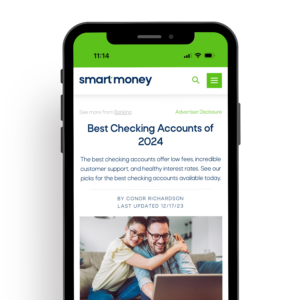Takeaways
- Personal finance experts recommend creating financial goals to prioritize actions.
- The annual 401(k) contribution limit is $23,000 for 2024 if you are under 50.
- Repaying high-interest debt or paying off student loans might take priority.
- Building savings like an emergency or slush fund can alleviate financial stress.
- Financial advisors can help sort through what should take priority to maximize your progress.
Personal finance success doesn’t usually occur linearly. Even for mega savers in the Financial Independence Retire Early (FIRE) community, achieving financial success occurs in stages and with a predictable pattern. Depending on where you are on your personal finance journey, contributing the maximum amount to your employer-sponsored 401(k) plan might not be the best financial decision.
Smart Money -> 5 Ways to Increase Your 401(k) Balance Quickly
Most of the success in personal finances comes from mental fortitude. Creating smart money habits like sticking to a financial plan, adhering to a budget, and regularly saving are all pieces of a puzzle that pave the way to financial success. Depending on where you are along the success continuum, you might have more important objectives than simply trying to maximize your 401(k) plan contributions.
Knowing Maximum 401(k) Contributions
If you are wondering what the 2024 maximum 401(k) contribution limit is, you are not alone. The maximum contribution tends to change annually and is determined by the Internal Revenue Service (IRS). The IRS typically announces changes in the fourth quarter of the calendar year.
Smart Money -> 401(k) Contribution Limits Fully Explained
For the tax year 2024, employees can contribute up to $23,000 to their 401(k)-plan account. This represents a $500 increase from the 2023 limits. For employers aged 50 and over, you are allowed catch-up contributions of up to $7,500 for 2024. With these amounts in mind, saving the full $23,000 or $30,500 might not be the best use of your time, money, and energy. This largely depends on how you are prioritizing your financial goals. For example, young professionals could be focusing on reducing their debt load.
Debt Repayment Goals
While saving for retirement is an absolute must amongst recommendations given by finance professionals, it is critical to look at your financials holistically. If you have just graduated from college or graduate school, your priority might not be saving for your retirement in 30 years. Instead, you might be focused on more near-term items like paying off high-interest credit card debt or getting rid of your student loans.
Smart Money -> 8 Steps to Pay Off Credit Card Debt Fast
There are two schools of thought when it comes to the best way to pay off debt. The best snowball method focuses on paying off your smallest balances first, regardless of interest rate. The avalanche method, however, prioritizes focusing on your debts with the highest interest rate first, regardless of balance.
Smart Money -> 7 Steps to Pay Off Student Loans Quickly
With rising cost of living, inflation, and higher housing costs, young professionals gravitate to trying to reduce their total debt outstanding. This frees up their monthly cash flow to live more comfortably and get some financial breathing room. Without the burden of high-interest debt, you can start aiming to build your net worth through savings and creating a financial barrier between your unexpected expenses.
Get Smart With Your Money
Fresh weekly articles delivered straight to your inbox.
Enter your name and email for free tips and tricks.

Emergency Fund
An emergency fund is one of the first saving hurdles most people face. According to a recent survey, the average U.S. citizen cannot come up with $1,000 to cover an emergency expense [1]. This is obviously problematic.
Smart Money -> How Much Money Should Your Keep In Your Savings Account
An emergency fund of $1,000 to $3,000 (if you live in a more expensive city) can absorb unexpected expenses and help you distance yourself from relying on high-interest debt, like credit cards. While you can technically access your 401(k) funds, an early withdrawal can come at the cost of penalties and taxes. Some 401(k) plans also offer 401(k) loans.
Smart Money -> What is a Slush Fund?
Non-Retirement Savings
Once you get past saving for an emergency fund, there are practical considerations for everyday life. For working professionals who must commute to the office, saving to buy a new car might be a better use of capital. Alternatively, you might be expanding your family size and need to upgrade from your sedan to an SUV.
Smart Money-> Working from Home (WFH): Pros and Cons
Another option is to pay off your car note quickly. Maybe you saved enough for a down payment on your car note but want to get rid of the note. Paying off this debt might take priority over maximizing your 401(k) savings.
While retirement savings can increase your net worth, so can other options. Buying a house can increase your net worth over time as you build home equity. And if you are in the family-building stage of life or want to own your house, saving for a down payment can be challenging. As one of the highest hurdles to homeowners, saving for a down payment can take years.
Smart Money -> 9 Steps to Quickly Save For a Down Payment
Other Investment Accounts
Another consideration is to analyze whether you should maximize your contributions to a Traditional IRA or Roth IRA. These accounts each have a 2024 contribution limit of $7,000, with a $1,000 catch-up contribution if you are 50 or older. IRA accounts have several advantages over an employer-sponsored 401(k) plan, including investment flexibility.
Smart Money -> 7 Types of Bonds. Here's What to Know
In these IRA accounts, you can invest in individual stocks or bonds. Additionally, they offer a variety of mutual funds and exchange-traded funds (ETFs), some of which are not available through the buffet of investment options in your 401(k) plan. Traditional and Roth IRAs are great places to invest, especially if you have already contributed up to your 401(k) matching contribution limit.
Smart Money -> Best Online Stock Brokerage Accounts
Find a Financial Advisor
Balancing today’s wants with your future needs is always a balancing act. Advice from a financial advisor can help you prioritize financial goals in an order that makes sense. It is essential to remember that you don’t have to accomplish everything at once. Instead, you can focus on building small wins. These small wins will usher in big changes later.
Smart Money -> Top 12 Most Common Financial Mistakes
Prioritization of your financial goals gives you clarity and relieves anxiety because you remove opaqueness from the future. With clear direction and actionable steps, you can create the future you want in a stepwise fashion.
Smart Summary
With your financial house in order, maximizing your 401(k) contributions can increase your retirement savings dramatically. Over time, these savings can accumulate and appreciate, providing much-needed financial support in your retirement years. Maximizing your annual 401(k) savings will make you a super saver and make you the beneficiary of your company’s matching contributions (if they provide this benefit).
Smart Money -> 5 Smart Money Savings Habits To Start Now
Achieving financial independence and gaining a solid retirement saves time and consistent savings. High-income earners can adopt the strategy of maximizing savings without significant lifestyle adjustments. But if you are still trying to meet other critical financial goals first, you can reprioritize maxing out your 401(k) contributions once those goals are completed.
(1) Bankrate. Bankrate’s 2023 Annual Emergency Savings Report. Last Accessed January 22, 2024.










